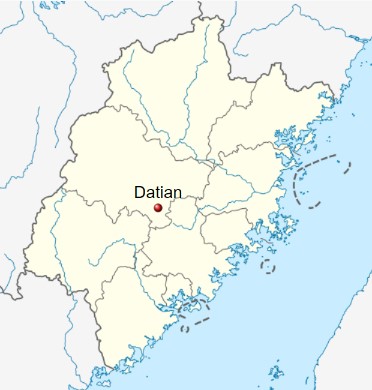

Dàtián Mǐn is a variety of Mǐn Chinese of uncertain position within the larger Mǐn group. It is spoken in Datian county of Fujian Province and is sometimes considered to be a subgroup within Southern Mǐn. The focus of this fieldwork is a particular dialect of Dàtián Mǐn known as Qiánlù, where two significant tone changes are occurring in one variety as spoken among roughly 14,000 residents of rural Húměi Township.


The Qiánlù dialect as a whole and the Húměi variety in particular are under considerable pressure from Mandarin, being the national language and language of classroom education. Under these circumstances, Dàtián Mǐn is likely to see a considerable drop in number of speakers in the coming generations, as well as a shift away from rural areas in Húměi Township toward the urban centre.
In this project, Tai and Kellen created an audio collection of 44 hours of Qiánlù dialect from two groups of language teachers. The first group was set up as a control group, consisting of 6 people from urban area of the Datian county. The second group was formed by 8 people from rural Humei Township to demonstrate tone changes in this variety. In order to capture language changes across generations, each group was further divided into two parts based on the age of participants. The recording included elicitation of a prepared word list, narratives and a short social-linguistic survey.

Due to COVID restrictions, data gathering were coordinated remotely. Two local research assistants, Gaoyan and Chen, were recruited and trained via Zoom video call to prearrange and manage recording sessions. They were also present during recording sessions to make language teachers more comfortable. We thank the Schweizerische Gesellschaft für bedrohte Sprachen for providing the funds to acquire the recording equipment and to pay the language teachers throughout the project.